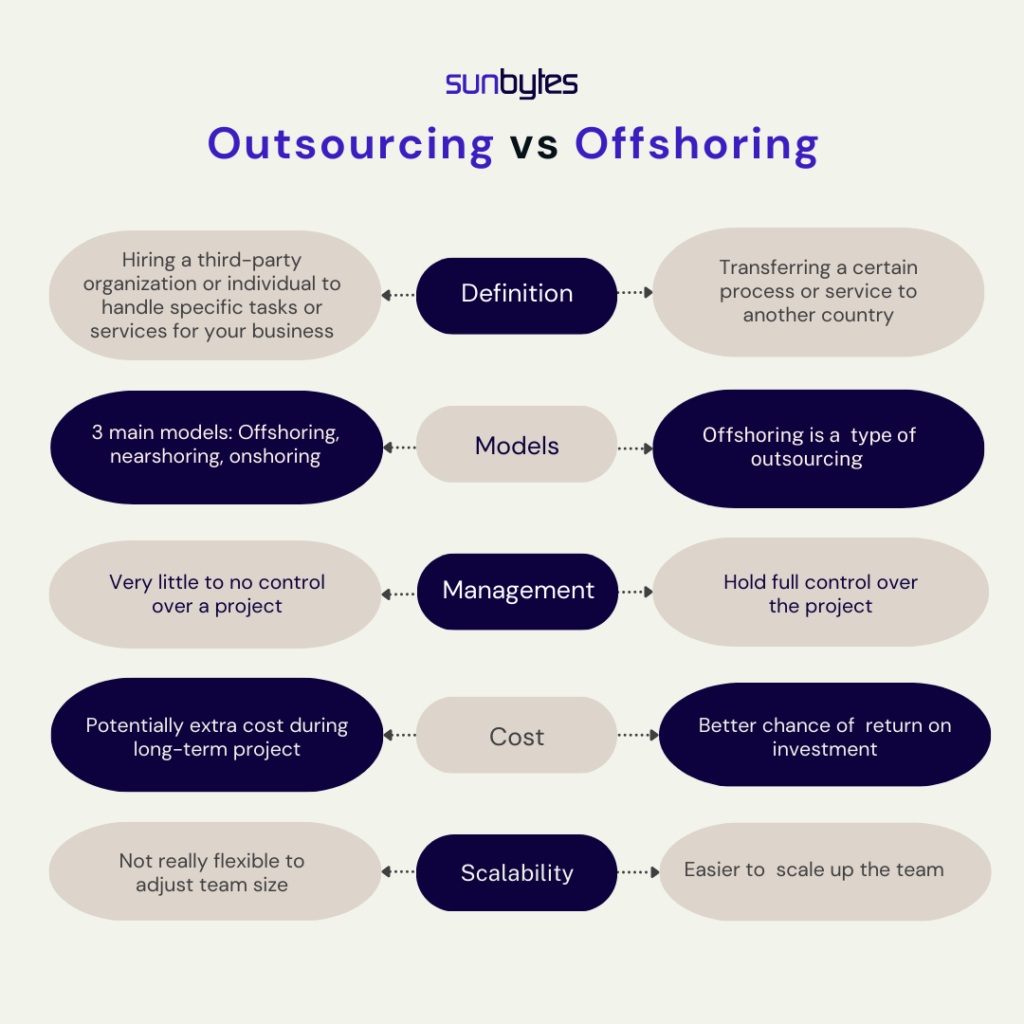Outsourcing and offshoring are two strategies gaining immense popularity in today’s business world. While being similar in many ways, they are also quite different. Understanding the critical differences between outsourcing and offshoring is essential for any company wanting to take advantage of these strategies.
This comprehensive guide will examine what outsourcing and offshoring are, their benefits and drawbacks, and their differences.
What is Outsourcing?
Outsourcing is the process of hiring a third-party organization or individual to handle specific tasks or services for your business, including customer service, accounting, or software development. It is becoming increasingly popular for companies to outsource these tasks as the expenditure on outsourcing worldwide is expected to reach $731 billion by 2023.
Outsourcing has three models, which are nearshoring, offshoring and onshoring.
Advantages of outsourcing
The reasons why companies, especially small businesses, favor outsourcing nowadays are because of their significant advantages:
- Cost savings: Outsourcing specific tasks can minimize the cost more effectively for a company than hiring the whole in-house team.
- Increased productivity: By outsourcing non-core business functions, companies can focus on their main competencies and improve efficiency.
- Quality workforce: Companies can access specialized skills and expertise that may not be available to in-house teams.
- Flexibility: Outsourcing allows a company to quickly scale up or down its operations in response to changing business needs.
- Improved quality: Businesses can expect higher quality outcomes as specialized service providers perform the work with a focus on delivering high-quality work.
- Reduced risk: Thanks to outsourcing services, organizations can now mitigate certain risks associated with a particular function or activity, such as legal or compliance risks.

Disadvantages of outsourcing
However, there are some potential drawbacks to outsourcing. One of the biggest concerns is that it can be challenging to ensure that the outsourced services are meeting certain business standards because you have little control over the project/service, as the team members won’t be reporting directly to you but to the outsourcing companies.
Additionally, there is the issue of data security and privacy, as the business is entrusting sensitive information to a third-party service. It is vital to implement proper security measures and that any contracts have clear terms and conditions.
Effective Strategies for Outsourcing
When it comes to outsourcing, businesses should keep a few strategies in mind.
- First of all, it is crucial to define your goals before outsourcing. This will help identify the project’s scope and communicate your expectations to the outsourcing partner.
- Secondly, you need to identify the right outsourcing partner: Look for those with the expertise and experience in the areas you want to outsource. You can refer to online directories, industry associations, and recommendations from other businesses to find potential partners.
- Communication is key to the success of outsourcing. Clear out your expectations and requirements to the partner so that you two can work without any hassles or misunderstandings in the beginning. This helps to address any issues or concerns that may arise during the working process. It also allows both parties to stay in contact and ensure the project is on track.
- The next step is to set all the necessary metrics and benchmarks to measure the performance of the outsourcing team. This will help you look at areas needing improvement and ensure that the outsourcing partner meets your expectations.
- Lastly, monitor the outsourcing process regularly to guarantee that the outsourcing partner meets the agreed-upon service level agreements (SLAs) and delivers the expected results. This will help you identify issues early and take corrective actions.
What is Offshoring?
The definition of offshoring might sound the same as outsourcing because it is an outsourcing type. However, one key difference involves transferring a particular process or service to another country by building dedicated teams abroad. This might include developing a product or service based on your requests and management control.
Advantages of offshoring
Here are some highlights of why you should consider offshoring for your business
- Cost efficiency: One of the primary reasons for offshoring is to reduce hiring costs. Many third-world countries have lower labor costs due to lower living expenses than developed countries. This is especially ideal for small companies with limited budgets.
- Diverse talent pool: Organizations can access a larger pool of talented workers with specialized skills. This can be particularly beneficial for businesses that operate in industries with a shortage of skilled workers in their home countries.
- Time zone advantages: Offshoring to countries in different time zones can provide around-the-clock support to customers and clients. It’s more convenient for businesses that operate in industries that require 24/7 support.
- Access to new markets: It’s easier to expand into new markets by establishing a presence in a foreign country. Offshoring can provide access to new customers and help businesses diversify their revenue streams.
Disadvantages of offshoring
Nevertheless, there are still some things that you need to consider before going all in offshoring. One of the biggest issues is businesses’ lack of control over the process. Without close monitoring, it might lead to a decline in product or service quality and positively impact the company’s reputation.
Moreover, companies might need some help with communication, as the time difference between countries can make it challenging to stay in contact. The language barrier is also a difficulty. These barriers can result in misunderstandings, misinterpretations, and delays in communication, which causes a disconnect in teamwork and collaboration.
Effective Strategies for Offshoring
The perks of offshoring are undeniable, but it also presents many challenges requiring careful planning and execution. Here are some effective strategies for offshoring:
- Choosing the right location: The success of an offshoring venture largely depends on selecting the right location. It would help if you also considered factors such as hiring costs, availability of skilled labor, political stability, infrastructure, and cultural compatibility. For example, India is a popular destination for offshoring IT services, while the Philippines is known for customer service outsourcing.
- Build strong communication channels: Communication is crucial in offshoring, especially when dealing with a remote team. Establish regular communication channels and ensure everyone involved in the project is on the same page. Video conferencing, messaging apps, and project management software can facilitate communication.
- Invest in training: You need to make sure that your offshoring team is equipped to handle your business processes with hands-on training. Provide comprehensive training on your company culture, policies, and procedures, as well as the skills needed to perform the tasks required.
- Maintain quality control: Quality control is essential to stay updated on whether the work meets the required standards. You should have quality control measures and monitor the job regularly. This will help you catch any errors or issues early on and ensure the work is of the desired quality.
- Be culturally sensitive: Different cultures have different ways of doing business, and it’s essential to understand your offshoring team culture. Learn about their cultural norms or practices and adapt your communication and management style accordingly.
- Protect your intellectual property: Last but not least, intellectual protection is crucial when offshoring. Ensure that you have appropriate contracts, non-disclosure agreements, and other legal protections to safeguard your business’ confidential information and proprietary technology.
By following these strategies, businesses can successfully navigate the challenges of offshoring and reap the benefits of lower costs, increased efficiency, and access to a skillful workforce.
Differences between Outsourcing vs Offshoring

There are a few critical differences between outsourcing and offshoring that businesses should be aware of; one of them is the location. With outsourcing, an external company or individual handles the services or processes, usually in the same country as the business. Meanwhile, ưwith offshoring, a company in another country holds the project or services.
Another key difference is the cost. Outsourcing is usually more expensive than offshoring, as labor costs in other countries are much lower than in your own country. Additionally, there might be some hidden or extra fees that may arise during a long-term project.
Besides this, offshoring provides access to a more extensive and diverse talent pool, and it will be easier to scale up the team as your businesses grow.
Finally, there are differences in terms of communication and control. With outsourcing, businesses have little to no control over the process. Meanwhile, with offshoring, you’ll have full access to the management of the project.
Conclusion
While outsourcing and offshoring can provide numerous benefits to businesses, it is essential to understand the differences between the two strategies. Ultimately, the decision to outsource or offshore should be based on a thorough analysis of the business needs and goals and the potential risks and benefits associated with each strategy. By weighing these factors carefully, businesses can determine which approach best suits their needs and achieve their objectives more effectively.
If you’re looking for a reliable outsourcing or offshoring partner to help you achieve your business objectives, Sunbytes is here to help. A team of experienced professionals and a proven track record of delivering high-quality results, Sunbytes can help you take your business to the next level with a wide range of outsourcing services. Contact us today to learn more about our services and how we can help you succeed.


